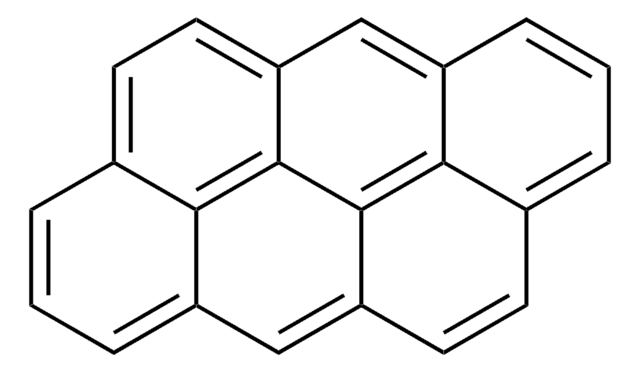48567
Anthracene
analytical standard
Sinónimos:
Anthraxcene, Paranaphthalene
About This Item
Productos recomendados
grade
analytical standard
Quality Level
vapor density
6.15 (vs air)
vapor pressure
1 mmHg ( 145 °C)
CofA
current certificate can be downloaded
autoignition temp.
1004 °F
packaging
ampule of 5000 mg
technique(s)
HPLC: suitable
gas chromatography (GC): suitable
bp
340 °C (lit.)
mp
210-215 °C (lit.)
solubility
alcohols: soluble
benzene: soluble
chloroform: soluble
hydronaphthalenes: soluble
supercritical carbon dioxide: soluble
application(s)
environmental
format
neat
Storage temp.
2-30°C
SMILES string
c1ccc2cc3ccccc3cc2c1
InChI
1S/C14H10/c1-2-6-12-10-14-8-4-3-7-13(14)9-11(12)5-1/h1-10H
Inchi Key
MWPLVEDNUUSJAV-UHFFFAOYSA-N
Gene Information
human ... CYP1A2(1544)
¿Está buscando productos similares? Visita Guía de comparación de productos
General description
Application
signalword
Warning
hcodes
Hazard Classifications
Aquatic Acute 1 - Aquatic Chronic 1 - Eye Irrit. 2
Storage Class
11 - Combustible Solids
wgk_germany
WGK 2
flash_point_f
249.8 °F - closed cup
flash_point_c
121.0 °C - closed cup
ppe
dust mask type N95 (US), Eyeshields, Gloves
Elija entre una de las versiones más recientes:
¿Ya tiene este producto?
Encuentre la documentación para los productos que ha comprado recientemente en la Biblioteca de documentos.
Los clientes también vieron
Nuestro equipo de científicos tiene experiencia en todas las áreas de investigación: Ciencias de la vida, Ciencia de los materiales, Síntesis química, Cromatografía, Analítica y muchas otras.
Póngase en contacto con el Servicio técnico

![Indeno[1,2,3-cd]pyrene certified reference material, TraceCERT®, Manufactured by: Sigma-Aldrich Production GmbH, Switzerland](/deepweb/assets/sigmaaldrich/product/structures/231/153/b0b230c2-efa0-4f43-a261-66b931ead3d2/640/b0b230c2-efa0-4f43-a261-66b931ead3d2.png)
![Benzo[a]anthracene analytical standard](/deepweb/assets/sigmaaldrich/product/structures/351/486/b3ddf157-a732-4ef8-83f0-c70a53404cb2/640/b3ddf157-a732-4ef8-83f0-c70a53404cb2.png)


![Dibenz[a,h]anthracene certified reference material, TraceCERT®, Manufactured by: Sigma-Aldrich Production GmbH, Switzerland](/deepweb/assets/sigmaaldrich/product/structures/358/871/0a80ecfc-d123-44ca-90a6-22248b43aba9/640/0a80ecfc-d123-44ca-90a6-22248b43aba9.png)





![Benzo[ghi]perylene analytical standard](/deepweb/assets/sigmaaldrich/product/structures/154/740/c50ff1be-dfb4-4159-a98c-9cecf9206ad3/640/c50ff1be-dfb4-4159-a98c-9cecf9206ad3.png)